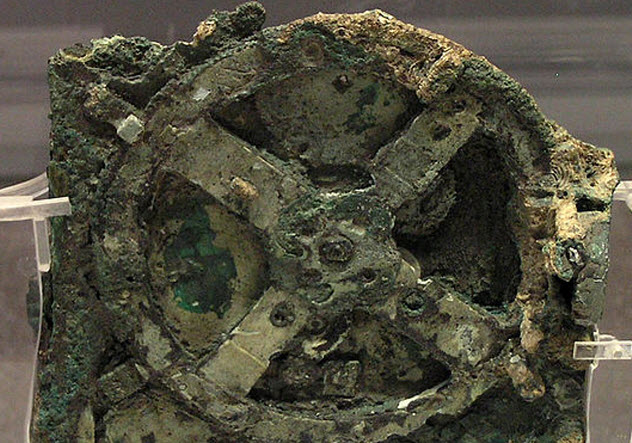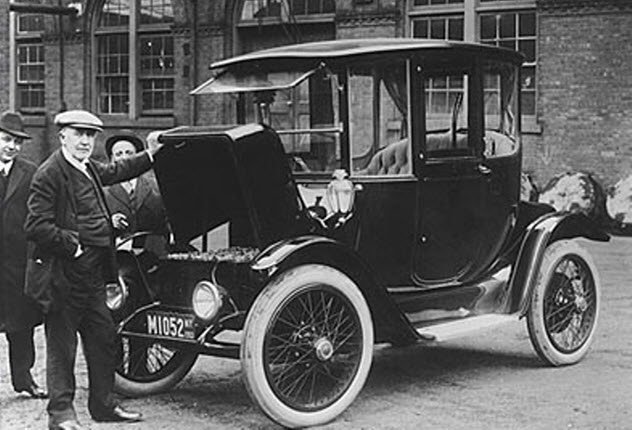 History
History  History
History  Weird Stuff
Weird Stuff 10 Wacky Conspiracy Theories You Will Need to Sit Down For
 Movies and TV
Movies and TV 10 Weird Ways That TV Shows Were Censored
 Our World
Our World 10 Places with Geological Features That Shouldn’t Exist
 Crime
Crime 10 Dark Details of the “Bodies in the Barrels” Murders
 Animals
Animals The Animal Kingdom’s 10 Greatest Dance Moves
 Movies and TV
Movies and TV 10 Box Office Bombs That We Should Have Predicted in 2025
 History
History 10 Extreme Laws That Tried to Engineer Society
 History
History 10 “Modern” Problems with Surprising Historical Analogs
 Health
Health 10 Everyday Activities That Secretly Alter Consciousness
 History
History 10 Dirty Government Secrets Revealed by Declassified Files
 Weird Stuff
Weird Stuff 10 Wacky Conspiracy Theories You Will Need to Sit Down For
 Movies and TV
Movies and TV 10 Weird Ways That TV Shows Were Censored
Who's Behind Listverse?

Jamie Frater
Head Editor
Jamie founded Listverse due to an insatiable desire to share fascinating, obscure, and bizarre facts. He has been a guest speaker on numerous national radio and television stations and is a five time published author.
More About Us Our World
Our World 10 Places with Geological Features That Shouldn’t Exist
 Crime
Crime 10 Dark Details of the “Bodies in the Barrels” Murders
 Animals
Animals The Animal Kingdom’s 10 Greatest Dance Moves
 Movies and TV
Movies and TV 10 Box Office Bombs That We Should Have Predicted in 2025
 History
History 10 Extreme Laws That Tried to Engineer Society
 History
History 10 “Modern” Problems with Surprising Historical Analogs
 Health
Health 10 Everyday Activities That Secretly Alter Consciousness
10 Cases Where Human Progress Has Reset Throughout History
People are comfortable with the idea that humanity is at the pinnacle of our experience as a species. However, people often forget that many wars, disasters, and massacres throughout history have wiped out much of our knowledge and forced us to start over on various subjects many times.
Despite this, many people still believe that humanity has slowly learned better social rules over time and has successfully built upon inventions to get where we are now. However, there are many examples in history when social rights existed, were lost, and then were regained. There have also been important inventions that historians now believe were discovered, lost, and rediscovered at least once by our species.
10 Women Have Fought The Battle For Their Rights Many Times

Today, there is strong support for ensuring that women are treated equally to men, and many laws have been put in place in recent years to that effect. There may even be a female president of the United States someday.
Some would say that women are taking large strides forward and becoming better treated than ever before in history. However, the truth is that women have sometimes been treated better or worse than now. It also varies during the same historical time period based on the part of the world you are in.
For example, in the United States, equal rights for women is currently a cause that is gaining steam with every passing day, and much has already been done to that effect. However, in Saudi Arabia, woman are treated more like chattel, and they have a long way to go. This was the same in terms of ancient history.
Many ancient cultures treated women badly, but many treated women with equal respect in comparison to men. Some Greek societies like the Spartans were very proud of their strong women, and Norse society put their women in charge of almost everything while the men were off raiding. Men and women were considered to be equal in Norse society and had equal say in the families’ major decisions. In addition, women were able to own property as much as any male member of Norse society.
Of course, at the same time in history, many cultures did not respect women or treat them equally. Women have been fighting the battle for their rights across many continents for a long time. It has not been a linear march of progression but a constant battle where ground is sometimes greatly gained and sometimes greatly lost. Rights are something that no one can take for granted. We all have to fight for fair rights for all people, or we will end up losing them over time. Then the next generations will have to fight for them all over again.
9 Gay Marriage And Other Relationships Were Once Perfectly Acceptable

Although some evangelical groups are still strongly against the gay lifestyle, the average Christian today takes a much more live-and-let-live attitude. They may not agree with a state-sanctioned gay partnership or believe that marriage among two people of the same gender is right according to their religion, but they believe in allowing other people to live their own lives without judgment. In most countries today, marriage between people of the same gender is legal and the battle has turned to rights for transpeople.
However, while some people laud this as the latest step forward for society, the truth is that we are not even close to being as accepting as people were in the ancient world. Even today, many people snidely make fun of those who are in same-sex relationships even if they are okay with it legally. Crude stereotypes are the norm, and some people are all too happy to make their distaste clear. In the ancient world, this could not be further from the case.
There is strong historical evidence that most ancient civilizations found same-sex relationships to be perfectly normal. Apart from the well-known proclivities of the men of ancient Athens, historians have found cultures like the ancient Egyptians and other African cultures to be strongly accepting of homosexual behavior and relationships.
But in their day, gender orientation was not a big deal like it is now. People would sometimes have relationships with both genders and wouldn’t necessarily classify themselves as one thing or the other. They simply had both kinds of relationships. It has only been fairly recently that homosexual relationships and orientation have become a subject of such strong disdain and scrutiny.
8 Child Labor Was Not A Problem Before The Industrial Revolution

While people would be right to think that laws against child labor are a recent thing, the truth is that child labor laws aren’t necessarily a straight societal progression. Rather, they are more of a reactionary law put in place due to a time period in history that changed the face of society forever and greatly ramped up the exploitation of not only children but all laborers in general.
This time period was the industrial revolution, and there is no doubt that its effects have greatly changed how the world works today. The industrial revolution changed the pace of the world and greatly decreased the demand for individual skilled laborers. It also increased the exploitation of both adult and child workers, but child laborers took the brunt due to society’s view of child labor before everything went mad.
In the ancient world and a small number of societies today, children worked but not in factories or anything of that sort. Instead, they were trained from an early age in the trade of their parents and helped out with the family business or whatever the family did to subsist.
This was and is not exploitation as the child learned valuable skills while working alongside their parents and helping to support the family at the same time. Their parents could make sure that their children weren’t overworked and could also use the time to properly bond with them. With the coming of the industrial revolution, many parents were no longer taking their children on as apprentices but instead were sending them to work in factories. Many children encountered hard conditions that were outside of their parents’ control and didn’t learn any valuable skills.
Even today in countries like the United States with strict child labor laws, there are still exceptions for parents who are teaching their kids important trades and need help on a farm or other similar situations. The reason is because the spirit of child labor laws is to protect children from exploitation. The idea of children just being kids and playing all the time is a recent idea.
7 The Invention Of Writing Doesn’t Have A Clear History

Many people like to think of our modern times as the latest progression in humanity, but they also tend to forget that we have suffered many setbacks in our knowledge as a species. Baghdad was once a jewel of learning in the ancient world. Then it was sacked and destroyed as was the Library of Alexandria and so many other places. While we like to think of writing as a fairly recent invention, the truth is that historians are not really sure when writing was first invented.
The best samples they have are from the Middle East and Mesoamerica in ancient days, and both were from around a similar time period. Years after this, multiple ancient peoples seem to have discovered writing on their own. Some historians are also unsure how many times writing or systems of writing have actually been invented from scratch by various groups throughout history and how many have actually been partly borrowed from the knowledge of neighboring humans.
We are also unsure how many times people invented writing and then had their civilization destroyed. We may yet find older samples of writing from more ancient peoples, and there is also the possibility that any evidence of their writing knowledge was simply destroyed. Many historians believe that it is impossible to know how many times humanity has invented systems of writing and then lost them again. We may yet learn about more ancient examples as we dig deeper into the Earth.
6 Air Conditioning Is Not A New Invention

As far as most people are concerned, air conditioning is an extremely recent convenience. While most people today who are used to air conditioning would absolutely hate to be without it, especially during the summer months, there are still many people around the world today who have no access to it. For this reason, most people who do have the convenience of air conditioning assume that ancient people had to suffer through hot summers and maybe cool off by swimming in a lake or something.
However, depending on how advanced the civilization was, there were multiple cultures with fairly advanced systems that can easily be categorized as air conditioning. In the ancient Middle East, structures were designed with spiraling systems to circulate airflow perfectly to cool the buildings. The Egyptian people had a fairly primitive air conditioning system where they would hang soaked mats in front of their doors to air-condition their homes.
By far, the most advanced air conditioning design was created by the ancient Romans. Using the aqueducts that distributed water throughout the city, they had a system to circulate water through the walls of their houses—essentially cooling the entire living quarters.
While this may not seem as advanced as some of what we use today, it certainly worked quite well for the people who used it. In fact, it may have been more environmentally friendly and energy efficient than today’s air conditioners, which all use refrigerant liquids like Freon.
5 Ancient Peoples Had An Amazing Grasp Of Mathematics And Invented An Analog Computer

Computers are something that people are certain are an entirely new invention. After all, our technological revolution has only been very recent. As far as we know, the digital devices we use today are a new thing, but complex analog mechanisms that can be described as computers are not a new thing at all.
One of the best examples is the Antikythera mechanism, a device discovered by historians that is believed to have come from ancient Greece. This incredibly complicated device was found deep underwater, ravaged by time and missing pieces. No one had paid attention to it for many years.
With more recent technology, however, scientists discovered that it was once an incredibly complicated analog computer with loads of sophisticated moving gears that used complex mathematics to track and plot the positions and movements of the stars and planets in the night sky. The device may not have been a digital computer, but it shows how far humanity has been able to progress and how many setbacks we have suffered.
Many people know that the Greeks were quite the scholars and well versed in mathematics and astronomy. But many people don’t realize just how many amazing devices the Greeks invented, and historians may still discover many more. Some historians even believe that part of the success of the Roman Empire was due to their ability to assimilate cultures they conquered instead of destroying them.
This allowed the Romans to build on the incredible inventions and knowledge of the ancient Greeks and create an incredibly powerful empire that spanned multiple continents. While much knowledge was still lost due to wars, sometimes among the Greeks themselves, it is likely that humanity would have been set back even further if the Romans had destroyed the people they defeated like some ancient conquerors.
4 The Current Stance Many People And Countries Have Against GMOs Is Setting Back The World

Many people today are concerned with practices involving genetically modified organisms (GMOs). Although it may sound like a somewhat scary term, GMO has a fairly broad meaning and isn’t as frightening as a lot of scaremongers make it out to be.
There is some legitimate concern about various companies copyrighting certain seed designs, and it’s understandable if people are bothered by some of Monsanto’s business practices. It’s also understandable if people are concerned with the trend in which seeds produce plants that don’t produce more seeds on their own. In the event of a disaster, those particular seeds could be very bad for the world. However, this concern has been conflated into an overall distrust of GMOs, and it is setting back scientific and human knowledge.
Experts like Neil deGrasse Tyson have tried to come out against the anti-GMO hysteria, but even they have been unable to do much good. The truth is that farmers—whether they are raising crops, animals, or both—have been using techniques to produce better crops and animals for thousands of years. Many of those techniques are not much different than those used by biotech companies today. These techniques have been used to get better yields, more eye-popping colors, more delicious flavors, and stronger smells. They have also been used to make specific animals that are better for certain kinds of hunting and better for eating.
These techniques are not new at all and are not harmful to humans in any way. In fact, many GMO crops help farmers increase yields, help seeds stay alive during cold snaps, and help crops to resist other problems like diseases. There are concerns about “seedless” plants, but many GMO plants do produce seeds. GMO plants in and of themselves are not dangerous for human consumption at all.
Most products in the grocery store that are labeled as “non-GMO” are really quite misleading. It should really say “non-recent GMO.” The truth is that if we literally stopped eating all genetically modified foods and animal products, if we could really trace the patterns of ancient farmers all the way back, we would likely find that we would have nothing acceptable left to eat.
3 Abortion Was Legally And Socially Acceptable In The United States In The Recent Past

Most people think that abortion was only made legal in the United States in the last few decades with the advent of the Roe v. Wade decision. Although abortion had been illegal when the Roe v. Wade decision was made, this was not the first time that abortion had been legal in the United States. Back in the 19th century, abortion was an incredibly common practice in the US.
Many drugs to induce abortion were openly advertised and sold, and while this particular trade was technically banned, it still widely persisted and was hardly enforced. Furthermore, the ban was not put in place to stop abortion per se but to stop the sale of dangerous abortion drugs that could harm or even kill women. One woman sold abortion services for 35 years in the 1800s. She made a full-time career out of it and never once ran afoul of the law over her operation. On the contrary, she was publicly lauded for her allegedly amazing pills.
The other misconception people have is that abortion was banned originally over moral concerns. While that may be the chief reason that people protest abortion today, they had different concerns back then. A good many of those lobbying to ban abortion were actually physicians. At the time, most abortions were performed by pseudo–medical professionals like midwives, and doctors felt like they were being dangerously left out of the equation.
There was also a strong element of support from jingoist groups like the KKK. At the time, immigrants were entering the country in great numbers and the KKK felt that the country needed a lot more white babies—as did other jingoist groups at the time. While there was also an element of support from morally opposed groups like the Catholics, the vast majority of the support was simply not there to stop abortion for religious or ethical reasons like today. Back then, the reasons for banning abortion were varied and complicated and mostly detached from the current ethical framework.
2 Race Relations Have Ebbed And Flowed Over Time

While it’s an understandably optimistic view to wish to live in a world where people will not see race, the truth is that people have long looked for ways to punish others for being different from them and that may never change. Some people have suggested that racial problems will end when almost all humans look the same from intermingling. But most likely, people will simply hate other people for another difference between them. A good example of this is the genocide in Rwanda. The two sides of the conflict are almost indistinguishable to most outsiders, but the genocide occurred nonetheless.
Many people are also convinced that race relations are historically at their best today. In many parts of modern society, it has become much less acceptable to harbor racist views or even hold onto stereotypes. In fact, people are often shunned for openly pushing racist viewpoints. However, what most people don’t realize is that race relations have gone through periods in history where they were not as volatile as they are now.
For example, when Pope Benedict XVI resigned recently, one of the candidates on the presumed short list was a black cardinal from Africa. The media breathlessly speculated about the “first black pope” in an absolutely epic misunderstanding of church history or historical race relations. Although we don’t have much proof of their features, at least three popes may have been black and definitely hailed from African origin in some form. In reality, it wouldn’t have been noteworthy enough to record at the time. North Africa was a very important center for early Catholicism, and a black African pope would not have been strange at all.
Although there have been many racial genocides throughout history, there have also been many examples of different people living in peace and tolerating one another’s races and religions just as well or better than people do today. Like the battle for women’s rights, fighting the ignorance of racism and the stereotyping of those who are different is something that we will always have to be vigilant against. Humans naturally gravitate to splitting into groups and finding differences.
1 The Very First Automobiles Were Electric Powered

Most people have heard of Tesla Motors, Inc., which is run by Elon Musk. His electric cars have been popular among those who can afford them and have reinvigorated the electric car market. However, many people assume that electric cars are just starting to hit their stride now. The truth is that electric cars were once the top dog in the automobile market and ended up losing their popularity.
In the 1800s, before Henry Ford had invented his famous mass production methods or his gas combustion automobile, several iterations of electric car had already been designed and were enjoying a fair amount of commercial popularity. When Ford came along, things started to change. The gasoline engine designed by Ford allowed people to go farther without needing to recharge their batteries or otherwise stop. His cars were also faster. These changes spelled the beginning of the end for the electric car, at least for many years.
In the 1960s, the electric car enjoyed a mild resurgence due to environmental concerns, but it still didn’t come close to retaking the throne over nonelectric cars. While Tesla Motors may yet bring electric cars back to the forefront, it may be a long time before that could even be possible, especially with the current costs associated with the technology. Regardless, electric cars are not a new idea and were actually the king of the early automobile scene.








